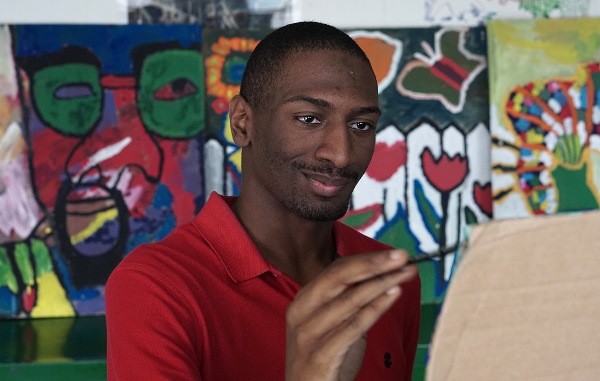This thought-provoking documentary begins as a heartfelt tribute by actor/co-producer Chris Cooper to his late son Jesse, who was born with cerebral palsy that resulted in a lower-than-average intelligence score. But as the elder Cooper points out, tests say nothing of any child’s potential, as Jesse became a straight-A student in high school, had lots of friends, and lived a rich and happy life until his passing in 2005. Jesse’s story makes the argument that persons considered “intellectually disabled” have something to teach all of us, which is not to say their lives aren’t challenging, as the film acknowledges by following three such persons attempting to make their way in the world.
According to the film, only 17 percent of persons with intellectual disabilities are included in regular classrooms, and yet the benefits of inclusiveness are evident in two out of the three main subjects. Naieer, 17, attends a high school in Massachusetts that takes pride in teaching students of different intelligence levels together, and 32-year-old Micah is pursuing a non-degree certificate at Syracuse University. Naieer and Micah were diagnosed with autism and low intelligence, respectively, yet when integrated within a general student populace, they learned and socialized. Naieer, in particular, cultivates a skill for painting.
Twenty-five-year old Naomie, in Rhode Island, was born with Down syndrome. She has what at first appears to be the most tenuous situation: she wants a job and career, but as she’s working at a coffee kiosk, it’s apparent she has trouble with tasks such as counting out change. Luckily, as is the case with Naieer and Micah, Naomie has a strong personal network that includes social workers who offer assistance. She eventually gets in touch with job placement professionals who send her down a slightly different path.
Each of the film’s subjects requires protection and help, with Naomie seemingly in need of the most in her daily life. Right now, Naieer enjoys a cocoon of involved teachers, but he will soon be graduating. Micah lives the most independently of the three, sharing a house with a non-family member, taking mass transit to class, and trying out dating for the first time. Over the course of the film, he starts seeing Meghan, who is also intellectually disabled and whom he connected with through their support group. It’s clear she is interested in him, but Micah can be difficult to read. We have no idea if he returns her feelings, and the early scenes between them are awkward. Micah’s story line is the most compelling at times, given how much independence he already has over his life, which only leads to his wanting more. Yet in truth, he is no more settled than either Naieer or Naomie.
In all three profiles, the tension tends to be less about what is happening in the present day and more about the future. Naieer’s teachers and parents, for example, worry about what could happen once he is out in the wider world, especially since he is African American, appears to be physically imposing, and has a tendency to flail his arms or display a surly attitude when frustrated. His teachers understand he means no harm, but the question is, how will strangers react. Indeed, we are often reminded of just how uncomfortable certain people are with those who are different, as all three protagonists encounter reactions from stares to worried looks.
The film repeatedly underscores how noteworthy it is that these three have options for work or a social life, given how badly those with intellectual disabilities have been treated over the years. Cooper, who also narrates, recalls America’s sad history with intelligence testing, which paved the way for such social ills as racial discrimination, forced sterilizations, and institutionalizing those considered mentally defective in facilities resembling prisons.
But director Dan Habib also looks back on the change in attitudes toward persons with intellectual disabilities, which began with parents of such persons advocating on their behalf during the 1950s and led to groundbreaking legislation, such as the Americans with Disabilities Act of 1990. These are some of the more inspiring sections of the film, as are those in which those closest to Naieer, Micah, and Naomie discuss how their lives have been enriched. Micah’s sister, for example, decided to become a special-education teacher for grade school children, and she shows uncanny patience in the classroom.
Ultimately, Intelligent Lives is a convincing argument for greater inclusiveness of those society previously shunned, as well as a rousing call to redefine the meaning of “intelligence.”

















Leave A Comment